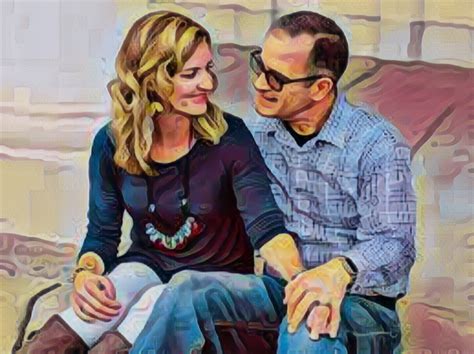
A grieving widower is facing opposition from his in-laws as he attempts to move on with his life and begin dating again after dedicating years to caring for his late wife. He says their interference is “unfair.”
A man identified only as “Ready to Move On” wrote to the “Dear Abby” advice column, detailing his situation: He devoted himself to caring for his wife during her long illness and after her passing, his in-laws are now vehemently disapproving of his attempts to start dating again, causing him considerable distress and prompting him to seek advice on how to navigate this delicate situation. This scenario highlights the complexities and emotional challenges that can arise when a surviving spouse seeks to rebuild their life after loss, particularly when family dynamics complicate the healing process.
The widower explained that he had been his wife’s primary caregiver for a considerable amount of time while she battled a long-term illness. He stated, “I took care of my wife for years during her long illness. It was exhausting, but I loved her and wouldn’t have had it any other way.” His commitment underscores the deep bond they shared and the sacrifices he made. Following her death, after what he considered a reasonable period of mourning, he felt ready to explore the possibility of companionship again. However, his in-laws have reacted negatively to this decision, creating conflict and emotional strain.
“Ready to Move On” expressed his frustration and hurt, stating that his in-laws “are acting like I’m betraying her memory.” He feels that their disapproval is unwarranted and unfair, especially considering the years he dedicated to his wife’s care. He wrote to Abby seeking guidance on how to handle this difficult situation, hoping to find a way to honor his late wife’s memory while also pursuing his own happiness and well-being. He needs advice on whether it is appropriate to cut them off.
Abigail Van Buren, the author of “Dear Abby,” responded to the letter, offering her perspective on the matter. She emphasized that the widower is entitled to move on with his life and that his in-laws’ reaction is unreasonable. She wrote, “Your in-laws are out of line. You are entitled to move on.” She further advised him to communicate his feelings to his in-laws, but ultimately, to prioritize his own emotional needs and decisions.
Van Buren’s response validates the widower’s feelings and encourages him to assert his right to pursue happiness. She suggests that while respecting the memory of his late wife is important, it should not come at the expense of his own well-being. The advice underscores the importance of setting boundaries and prioritizing one’s own emotional needs, even when dealing with grieving family members.
The situation raises several important questions about grief, relationships, and the expectations placed on individuals after the death of a spouse. It highlights the often-conflicting emotions that can arise within families as they navigate the grieving process and adjust to new realities. The case also sheds light on the societal pressures and judgments that widows and widowers may face when they choose to move forward with their lives.
This conflict illustrates a common tension between honoring the past and embracing the future. While the in-laws may feel they are protecting their daughter’s memory by discouraging the widower from dating, their actions are causing him significant emotional distress. It also raises questions about how long is considered an appropriate amount of time to grieve before a widow or widower is expected to move on. There is no one-size-fits-all answer, as each individual’s grieving process is unique and influenced by various factors, including the nature of the relationship with the deceased, personal coping mechanisms, and cultural norms.
The advice provided by “Dear Abby” reflects a growing recognition of the importance of individual well-being and the right to pursue happiness after loss. While societal expectations may sometimes dictate prolonged mourning, mental health professionals increasingly emphasize the need for individuals to find healthy ways to cope with grief and rebuild their lives. This may include seeking companionship, engaging in social activities, and pursuing personal interests.
Moreover, the situation underscores the complexities of family dynamics during times of grief. The in-laws’ reaction may stem from their own unresolved grief, feelings of protectiveness towards their deceased daughter, or concerns about the widower’s intentions. Understanding the underlying emotions driving their behavior can help the widower approach the situation with empathy and compassion, even while asserting his own needs.
The widower’s experience also highlights the importance of open and honest communication within families. While it may be difficult to discuss sensitive topics such as dating after loss, clear and respectful communication can help to bridge divides and foster understanding. It is crucial for the widower to express his feelings to his in-laws, explaining that his decision to date does not diminish his love and respect for his late wife. At the same time, he should also be willing to listen to their concerns and acknowledge their grief.
In conclusion, the case of “Ready to Move On” illustrates the emotional challenges and familial conflicts that can arise when a surviving spouse seeks to rebuild their life after loss. It underscores the importance of respecting individual grieving processes, setting boundaries, and prioritizing one’s own well-being. The advice provided by “Dear Abby” offers valuable insights into navigating these complex situations and encourages individuals to assert their right to pursue happiness while honoring the memory of their deceased loved ones. Ultimately, finding a balance between honoring the past and embracing the future is essential for healing and moving forward.
Expanded Context and Background Information:
The issue of when and how a widow or widower should move on after the death of a spouse is fraught with complex emotions and societal expectations. Grief is a deeply personal experience, and there is no universally accepted timeline for healing. Factors such as the length and quality of the marriage, the circumstances of the death, the individual’s personality and coping mechanisms, and cultural norms all play a significant role in shaping the grieving process.
Historically, societal norms often dictated prolonged periods of mourning, particularly for women. Widows were expected to wear black clothing, abstain from social activities, and dedicate themselves to honoring the memory of their deceased husbands. While these strict customs have largely faded in modern society, the underlying expectation that widows and widowers should remain devoted to the memory of their deceased spouses can still persist.
However, mental health professionals increasingly recognize the importance of allowing individuals to grieve in their own way and at their own pace. Prolonged isolation and adherence to rigid mourning rituals can be detrimental to mental health and well-being. Instead, experts recommend finding healthy ways to cope with grief, such as seeking therapy, engaging in social activities, pursuing personal interests, and building new relationships.
The decision to start dating again after the death of a spouse is a deeply personal one. There is no “right” or “wrong” time to begin exploring new relationships. Some individuals may feel ready to date within a few months of their spouse’s death, while others may take years or never feel ready at all. The key is to listen to one’s own heart and intuition and to make decisions that are consistent with one’s own values and needs.
One of the challenges that widows and widowers often face is navigating the expectations and opinions of family and friends. As the “Ready to Move On” case illustrates, family members may have strong feelings about when and how a surviving spouse should move on with their life. These feelings may stem from their own grief, their attachment to the deceased spouse, or their concerns about the surviving spouse’s well-being.
It is important for widows and widowers to communicate openly and honestly with their family and friends about their feelings and intentions. While it may be difficult to discuss sensitive topics such as dating, clear and respectful communication can help to bridge divides and foster understanding. It is also important to set boundaries and to prioritize one’s own emotional needs.
In some cases, family members may benefit from seeking their own grief counseling or therapy. This can help them to process their own emotions and to better understand the surviving spouse’s needs. It can also help them to develop healthy coping mechanisms and to avoid projecting their own grief onto the surviving spouse.
Ultimately, the goal is to find a balance between honoring the memory of the deceased spouse and embracing the future. This may involve incorporating aspects of the deceased spouse’s life and legacy into the surviving spouse’s new life. It may also involve finding new ways to connect with the deceased spouse’s memory, such as through charitable donations or memorial activities.
Ethical Considerations
The situation presented by “Ready to Move On” also raises important ethical considerations. The in-laws’ behavior, while potentially stemming from grief, is infringing upon the widower’s autonomy and right to pursue happiness. Ethical frameworks emphasize the importance of respecting individual autonomy and allowing individuals to make their own decisions about their lives, even if those decisions are not aligned with the preferences of others.
Furthermore, the principle of beneficence suggests that actions should be taken to promote well-being and prevent harm. In this case, the in-laws’ actions are causing the widower emotional distress, which could be considered harmful. Therefore, ethically, they should reconsider their behavior and prioritize the widower’s well-being.
However, it’s also important to consider the ethical principle of non-maleficence, which states that one should do no harm. The in-laws may perceive their actions as a way to protect their daughter’s memory and prevent what they see as a betrayal. Understanding their perspective is crucial, but it does not justify infringing upon the widower’s rights.
A balanced approach that respects all parties involved requires open communication, empathy, and a willingness to compromise. The widower should communicate his feelings and needs to his in-laws while acknowledging their grief and concerns. The in-laws should be willing to listen and understand the widower’s perspective, even if they do not agree with his choices. A mediator or therapist could facilitate these conversations and help the family find a way to move forward in a healthy and respectful manner.
Cultural Perspectives on Grief and Dating After Loss:
Cultural norms and traditions significantly influence how grief is experienced and expressed, as well as the acceptable timeline for moving on after the loss of a spouse. In some cultures, prolonged periods of mourning are expected, with specific rituals and customs dictating the behavior of widows and widowers. For example, in some traditional Hindu communities, widows are expected to wear white clothing and abstain from social activities for a year or longer after their husband’s death.
In contrast, other cultures may have more flexible or pragmatic approaches to grieving and dating after loss. In some Western societies, there is a growing recognition of the importance of individual well-being and the right to pursue happiness, even after the death of a spouse. This may lead to a more accepting attitude towards widows and widowers who choose to start dating again relatively soon after their loss.
It’s also important to consider how cultural beliefs about marriage and family influence attitudes towards dating after loss. In some cultures, marriage is viewed as a lifelong commitment, and the idea of a widow or widower remarrying may be seen as disrespectful to the deceased spouse. In other cultures, marriage may be viewed as a more practical arrangement, and remarriage may be seen as a way to ensure the surviving spouse’s financial and emotional security.
Understanding these cultural differences is crucial for navigating the complexities of grief and dating after loss. What is considered acceptable or appropriate in one culture may be viewed as taboo or disrespectful in another. By being aware of these differences, individuals can approach these situations with greater sensitivity and understanding.
Legal Considerations:
While the “Ready to Move On” case primarily involves emotional and familial issues, it’s important to briefly touch upon the legal considerations that may arise in similar situations. In most jurisdictions, a surviving spouse has the legal right to make their own decisions about their personal life, including whether or not to date or remarry. In-laws generally do not have the legal authority to dictate or control these decisions, unless there are specific legal arrangements in place, such as a guardianship or conservatorship.
However, legal issues may arise if there are disputes over inheritance or property rights. For example, if the deceased spouse’s will includes provisions that restrict the surviving spouse’s ability to remarry or cohabitate, these provisions may be legally enforceable. It’s also possible that in-laws may attempt to challenge the surviving spouse’s inheritance rights if they believe that the surviving spouse is not acting in the best interests of the deceased spouse’s estate.
In such cases, it’s essential for the surviving spouse to seek legal advice from an attorney who specializes in estate planning and probate law. An attorney can help the surviving spouse understand their legal rights and obligations and can represent their interests in any legal proceedings.
Strategies for the Widower:
Given the complex situation “Ready to Move On” faces, here’s a suggested strategy, drawing from therapeutic and communication principles:
-
Acknowledge and Validate His Own Grief: Before addressing his in-laws, he needs to ensure he has processed his own grief to a healthy extent. This might involve therapy, support groups, or journaling. It’s vital he is secure in his emotional state.
-
Prepare for a Conversation: Before talking to his in-laws, he should write down what he wants to say. This helps in organizing thoughts and ensuring key points are covered calmly.
-
Choose the Right Time and Place: Select a time when everyone is relatively calm and not overly stressed. A neutral location may be preferable to avoid triggering emotional responses associated with specific places.
-
Start with Empathy: Begin by acknowledging their grief and loss. “I know you are hurting and missing [deceased wife] terribly, and I understand this is a difficult time for all of us.”
-
Express His Feelings Clearly and Respectfully: He needs to state his feelings without being accusatory. For example, “I loved [deceased wife] deeply, and caring for her was an act of love. I am now at a point where I feel ready to explore companionship again. This doesn’t diminish my love for her.”
-
Set Boundaries Firmly but Kindly: He needs to clearly state that while he values their opinions, his decisions about his personal life are his own. “I value your opinions, but I need you to respect my decision to move forward. I hope we can find a way to maintain a relationship while respecting my boundaries.”
-
Listen to Their Concerns: Actively listen to their concerns and try to understand their perspective, even if he doesn’t agree with it. Repeat back what they’ve said to ensure understanding. “So, it sounds like you’re worried that I’m forgetting [deceased wife] or disrespecting her memory?”
-
Offer Reassurance (Without Apologizing for His Feelings): Reassure them that his love for their daughter and the memories they shared will always be cherished. “I will always cherish my memories of [deceased wife]. Moving forward doesn’t erase the past.”
-
Suggest Professional Mediation: If the conversation becomes too heated or unproductive, suggest involving a neutral third party, such as a therapist or mediator, to facilitate communication.
-
Be Prepared to Distance Himself (If Necessary): If they continue to be disrespectful and refuse to acknowledge his boundaries, he must be prepared to distance himself from them for his own well-being.
-
Seek Ongoing Support: Continue seeking support from friends, family, or a therapist to help him navigate this challenging situation.
FAQ (Frequently Asked Questions):
-
How long should a person wait before dating after the death of a spouse?
There is no set timeline for dating after the death of a spouse. The appropriate time to begin dating again is a deeply personal decision that depends on individual circumstances, including the length and quality of the marriage, the circumstances of the death, personal coping mechanisms, and cultural norms. Some individuals may feel ready to date within a few months, while others may take years or never feel ready. The key is to listen to one’s own heart and intuition and to make decisions that are consistent with one’s own values and needs. Mental health professionals generally advise waiting at least a year to avoid making any major life decisions.
-
Is it normal for family members to disapprove of a widow or widower dating again?
It is not uncommon for family members to have strong feelings about a widow or widower dating again. These feelings may stem from their own grief, their attachment to the deceased spouse, or their concerns about the surviving spouse’s well-being. In some cases, family members may feel that dating again is disrespectful to the memory of the deceased spouse. It’s important to acknowledge and validate these feelings, while also setting boundaries and prioritizing one’s own emotional needs. Open communication, empathy, and a willingness to compromise can help to navigate these complex family dynamics.
-
What can a widow or widower do if their in-laws are interfering with their dating life?
If in-laws are interfering with a widow or widower’s dating life, it’s important to address the situation directly and assertively. First, the widow or widower should communicate their feelings to their in-laws, explaining that their decision to date does not diminish their love and respect for their deceased spouse. They should also set clear boundaries and make it clear that they are entitled to make their own decisions about their personal life. If the in-laws continue to interfere, the widow or widower may need to limit contact with them or seek the assistance of a therapist or mediator to facilitate communication.
-
How can a person honor the memory of their deceased spouse while also moving on with their life?
Honoring the memory of a deceased spouse while moving on with one’s life involves finding a balance between cherishing the past and embracing the future. This may involve incorporating aspects of the deceased spouse’s life and legacy into the surviving spouse’s new life. It may also involve finding new ways to connect with the deceased spouse’s memory, such as through charitable donations, memorial activities, or simply sharing stories and memories with others. It’s important to find ways to keep the deceased spouse’s memory alive while also creating new experiences and building new relationships.
-
What resources are available for widows and widowers who are struggling with grief and loss?
There are many resources available for widows and widowers who are struggling with grief and loss. These resources include grief counseling and therapy, support groups, online forums, and books and articles on grief and bereavement. Mental health professionals can provide guidance and support in processing grief and developing healthy coping mechanisms. Support groups can offer a sense of community and connection with others who have experienced similar losses. Online forums can provide a safe and anonymous space to share feelings and experiences. Additionally, numerous books and articles on grief and bereavement can provide valuable insights and information. Local hospices often offer bereavement support services even if the deceased was not in their care.









